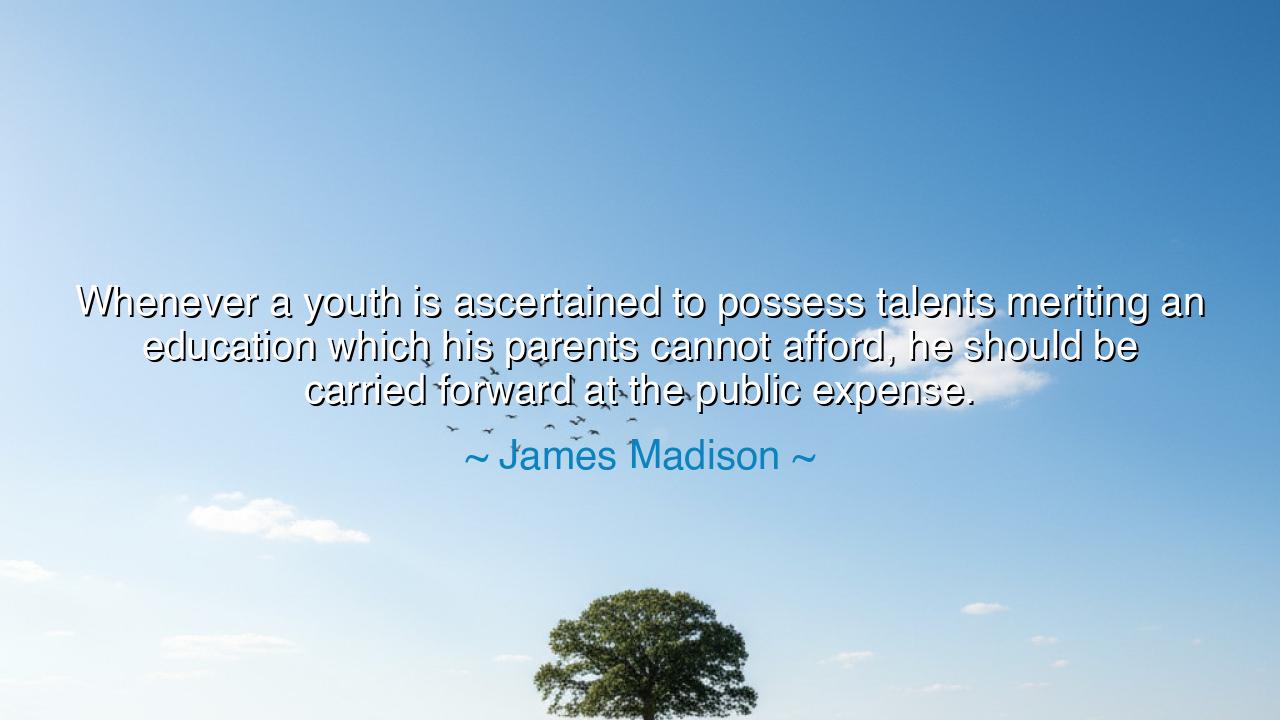
Whenever a youth is ascertained to possess talents meriting an
Whenever a youth is ascertained to possess talents meriting an education which his parents cannot afford, he should be carried forward at the public expense.






Hear, O seekers of wisdom, the solemn words of James Madison, Father of the Constitution, who declared: “Whenever a youth is ascertained to possess talents meriting an education which his parents cannot afford, he should be carried forward at the public expense.” This is no small thought, but a vision rooted in justice and foresight. It proclaims that the greatness of a nation is measured not by how it rewards the wealthy, but by how it uplifts the gifted child of humble birth. To discover talent and let it wither for want of means is a betrayal of destiny itself.
For what is education, if not the bridge between potential and fulfillment? In every child there lies a spark—sometimes faint, sometimes hidden, but capable of burning into a flame that can warm nations. Madison’s words remind us that it is not enough to recognize brilliance; it must be nourished. To deny the poor child an education is to chain the eagle to the ground and forbid it the sky. But to provide for them, even from the public expense, is to invest in the very soul of the republic, for their triumph becomes the triumph of all.
Consider the story of Abraham Lincoln, born in poverty, raised in log cabins, his formal schooling scarcely more than a year. Yet with borrowed books and relentless hunger for knowledge, he taught himself law, reason, and leadership. Had his talents been nurtured by public support, his path might have been less harsh—but still, his rise proved Madison’s point: that the greatness of a nation often rests upon the education of those least expected to succeed. Without Lincoln’s cultivated wisdom, America might have perished in its Civil War.
Look, too, to the life of George Washington Carver, born into slavery and orphaned in infancy. Denied opportunity by circumstance, he pursued knowledge with unbreakable perseverance, walking miles to attend school, often rejected because of his race. Yet when at last his talents were recognized and supported, he transformed agriculture, inventing new uses for crops and teaching sustainable farming to the poor. His story is living testimony that when society invests in the overlooked youth, the harvest returns a hundredfold.
Madison, wise statesman of the early Republic, understood that a democracy cannot thrive if its treasures are hoarded by the few. To sustain liberty, talent must be cultivated wherever it is found, not only in the homes of the rich but also in the cottages of the poor. For the republic belongs to all, and thus the burdens and blessings must also be shared by all. To invest in the education of the gifted poor is not charity—it is justice, it is foresight, it is the lifeblood of democracy itself.
Beware, then, the danger of neglect. If the child of promise is left untaught, the nation loses not only a scholar but a statesman, not only a craftsman but an inventor, not only a poet but a prophet. The wasted mind becomes the wasted future. And what is a people that squanders its youth but a tree that cuts off its own roots? No republic can endure if it casts aside the talents of its children because of poverty.
Therefore, let us take this lesson to heart: seek out the bright, the curious, the capable, no matter where they are born. Support them through public education, scholarships, and opportunity, that they may rise to their full stature. Parents may lack wealth, but the nation cannot afford to lack vision. Every youth lifted by knowledge strengthens the whole; every talent cultivated becomes a pillar of the common good.
The charge is clear: carry forward the youth at the public expense when private means fail. For in doing so, we secure not only their destiny but our own. Let no gift be buried by poverty, let no mind be stunted by want. Invest in them, guide them, nurture them, and the nation will reap not merely prosperity, but greatness. Thus spoke Madison, and thus must we live, if the flame of democracy is to endure for generations yet unborn.






AAdministratorAdministrator
Welcome, honored guests. Please leave a comment, we will respond soon